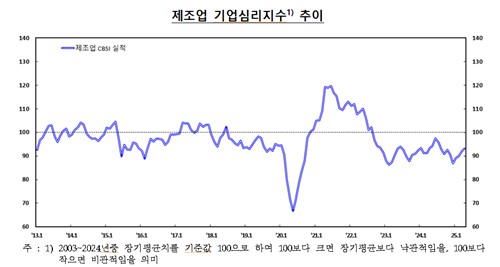(Seoul=Yonhap Infomax) Jee Hyun Son = The Business Survey Index (BSI) for all industries has improved for the second consecutive month. However, it still falls short of the level seen in November last year, before the December 3 state of emergency. Given the increased external uncertainties due to U.S. tariff policies, it's difficult to predict whether this improvement trend will continue.
According to the "April 2025 Business Survey Results" released by the Bank of Korea on the 24th, the BSI for all industries in April was 87.9, up 1.2 points from the previous month.
This marks the second consecutive month of improvement since it rose in March for the first time in five months.
However, considering that it has continued a sharp downward trend since the December 3 state of emergency, the rebound is not significant.
The all-industry BSI was at 91.8 in November last year, but plummeted after the state of emergency and has remained in the 80s for five consecutive months.
Hye-young Lee, head of the Economic Sentiment Survey Team at the Bank of Korea's Economic Statistics Department 1, said, "Although the sentiment index has risen for two consecutive months, it's still below the long-term average and hasn't yet reached the level of last November. It's difficult to say the current situation is good."
She added, "We need to keep watching whether the overall improvement trend will continue."
The manufacturing sentiment index recorded 93.1, up 1.2 points from the previous month, with increases in product inventory (+1.1p) and new orders (+0.6p).
By specific industry, improvements were seen mainly in electronic, video, and communication equipment (new orders +15p, business conditions +11p), metal processing (new orders +10p, business conditions +1p), and non-metallic minerals (business conditions +12p, new orders +6p).
The electronic, video, and communication equipment sector was positively affected by increased exports to secure volume before tariffs and improved profitability due to rising semiconductor prices.
Metal processing saw increased demand from forward industries such as shipbuilding, defense, and construction, while non-metallic minerals benefited from active construction starts due to seasonal factors.
By size, large companies recorded 95.9, up 0.1p from the previous month, while SMEs recorded 89.7, up 1.9p.
By type, export companies recorded 96.7, down 0.9p, while domestic companies recorded 91.7, up 1.5p.
The non-manufacturing business sentiment index was 84.5, up 1.6p, with profitability (+1.0p) and business conditions (+0.4p) being the main factors for the increase.
By specific industry, improvements were seen mainly in construction (sales +5p, business conditions +2p), wholesale and retail (sales +4p, profitability +3p), and arts, sports, and leisure-related services (business conditions +16p, profitability +17p).
The real estate industry was affected by the seasonal increase in construction progress rates. The wholesale and retail industry saw improved business conditions, mainly in the oil wholesale sector, due to increased demand before the decision to extend the oil tax cut.
The arts, sports, and leisure-related services sector was influenced by an increase in golf course users.
The outlook for next month was also positive.
The business sentiment index forecast for May showed that manufacturing is expected to rise 0.1p from the previous month to 90.0, while non-manufacturing is expected to rise 1.4p to 83.8.
In manufacturing, improvements are expected mainly in electronic, video, and communication equipment (business conditions +9p, new orders +7p), other machinery and equipment (business conditions +6p, new orders +6p), and shipbuilding and other transportation (new orders +15p, production +7p).
Team leader Lee Hye-young said, "In the case of semiconductors, although there are concerns about tariffs, the outlook remains positive as performance is still good. However, for automobiles, where tariffs are already in effect, the business outlook is deteriorating."
She added, "Many export companies have a negative outlook due to concerns about economic recession caused by tariff policies."
In non-manufacturing, improvements are expected mainly in construction (financial conditions +6p, profitability +3p), wholesale and retail (sales +4p, profitability +4p), and arts, sports, and leisure-related services (profitability +12p, financial conditions +10p).
By size, large companies are expected to record 92.7, down 1.4p from the previous month, while SMEs are expected to record 87.7, up 2.1p. By type, export companies are expected to record 93.8, down 0.2p, while domestic companies are expected to record 87.9, down 0.5 points.
The Economic Sentiment Index (ESI) for March recorded 87.4, up 0.2p from the previous month.
The cyclical component was 86.0, down 1.0p from the previous month.
When asked about industry-specific management difficulties, "uncertain economic conditions" was cited as the highest concern, with 28.2% in manufacturing and 23.7% in non-manufacturing.

Copyright © Yonhap Infomax Unauthorized reproduction and redistribution prohibited.

